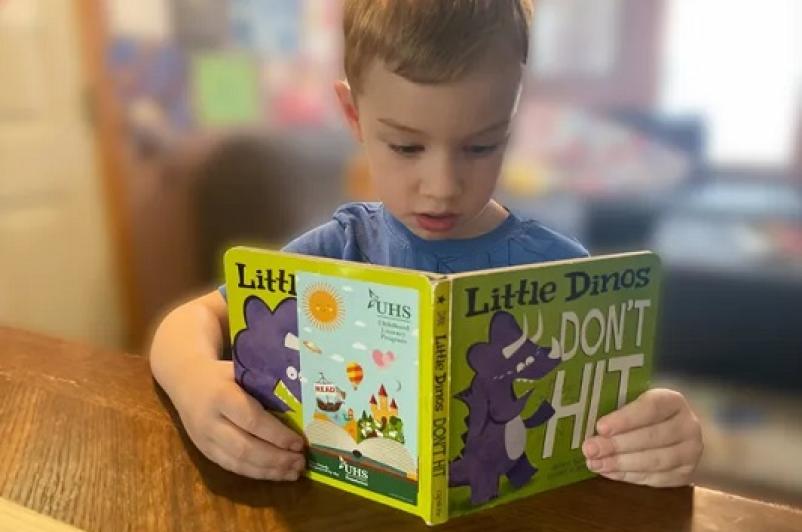
Providing children with a healthy foundation to succeed cognitively, socially, and emotionally is crucial to UHS. Part of that success is exposing them to books and reading at an early age through our UHS Childhood Literacy Program. Our goal is to build strong children by incorporating early literacy into pediatric care and encouraging families to read together. The more words you introduce to your child before the age of three years old, the better the language skills your child will acquire. Research proves that this leads to better school readiness and academic achievement.
Since March 2019, UHS has been participating in the Reach Out and Read program and providing books through our UHS Childhood Literacy Program. The Boston-based nonprofit Reach Out and Read program began in 1989 to help families make reading a part of their routine and champion the positive effects of daily reading. Now, the program is in all 50 states, with 6,000 program sites that provide 6.6 million books each year. UHS is proud to be a part of this national program that promotes healthy children and stronger communities.
With the help of the UHS Foundation, children can receive books through their well visits at UHS Pediatrics and several UHS Primary Care locations. In the last four years, the foundation has donated over $52,000 to the Reach Out and Read Program to help encourage families to read together. “It’s a great opportunity for providers to connect with families and children. It’s also a great motivator to get children into their well visits,” said Cory Jacobs, Executive Director of the UHS Foundation. The Reach Out and Read Program only includes children up to five years old. However, the UHS Foundation board recognized the value of child literacy and decided to fund books through the UHS Childhood Literacy Program for six to eight-year-olds as well.
UHS Pediatric providers start incorporating books into the pediatric well visits as early as six months of age. UHS pediatrician Katarzyna Dudycz-Sulicz, MD, says, "Our wellness visits encompass a lot of participatory guidance. Part of it is language development and getting early literacy skills. Reading goes along with language development and is part of our developmental surveillance." The American Academy of Pediatrics recommends early literacy promotion from infancy as an essential component of pediatric care. Pediatric care providers see children for wellness visits 13 times by the age of five years old, and each of these visits is an opportunity to promote reading activities. Dr. Sulicz also believes introducing books at an early age allows parents and children to develop a better connection. “It’s not just about giving a child a book; it’s about engaging the parent and child because of the common time spent reading the book, which is known to be the most beneficial in the intellectual and language development, as well the psychology bonding."
Vestal Pediatrics Office Supervisor, Michelle Brooks, is heavily involved in the Reach Out and Read Program. She buys the books quarterly from a Reach Out and Read approved website called All About Books, which offers discount pricing to participating practices. Michelle chooses various titles (currently numbering more than 240, with bilingual options) for different age groups that incorporate educational and life lessons. Once she receives the books, she divides them among all the UHS pediatric and family medicine offices. “There’s nothing better than seeing kids walking out and reading their book,” said Michelle. Since participating in 2019, UHS providers have distributed 32,511 books to families and children through their wellness visits.
Early literacy is fundamental for the child’s intellectual development, but it goes beyond just starting at an early age. It’s beneficial to keep up with your child’s reading skills throughout their young life, especially during summer break. According to Scholastic, younger children are prone to the most learning loss because they’re at a crucial stage in their development, and the lack of reading during the summer months contributes to the summer slide, the loss of academic skills that occurs when school is not in session. So as the school year ends and summer break starts, go to your local library to get more books and encourage your child to continue reading throughout the summer.
For more information on UHS Pediatric Services and providers, please visit nyuhs.org.


